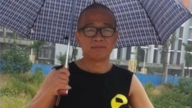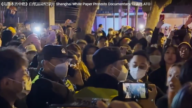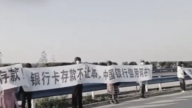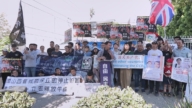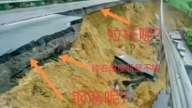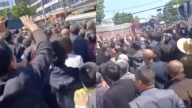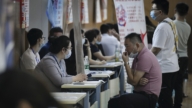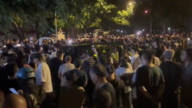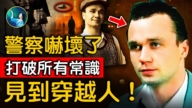【新唐人2013年01月12日訊】在社會各界強烈的「廢除勞教制度」的呼聲中,中共中央政法委書記孟建柱終於在1月7號宣佈「停用」勞教制度。正當舉國上下打算為此歡呼時,一盆涼水當頭潑下,消息傳出,另一個類似勞教制度的法律正在擬定,所謂勞教改革只是換了個「馬甲」而已。
《百度》百科是這樣定義勞教制度的:勞教制度就是公安機關「無須經過法院審訊定罪」,就可將疑犯投入勞教場所,實行最高限期為四年的「限制人身自由、強迫勞動、思想教育」等措施。自從中國大陸實施勞教制度以後,就多出了無數的冤假錯案,勞教所裡多出了無數被迫害致死的冤民。
大陸民權律師唐吉田向《新唐人》表示,勞教制度是一個惡法,它既違反國際人權公約的相關原則,也與中國大陸現行法律,比如說像憲法、律法法等相衝突。
唐吉田:「這樣一個制度它不經過司法審查,就由警察一家就可以決定對公民人身自由剝奪,少則一到三年,甚至可以達到四年,那麼這個過程就是非常封閉、非常不透明的一種狀態下,公民沒有任何救濟的手段。」
吉林省伊通縣法院副院長郭學宏,因為反對庇護被告人,而被勞教一年。未經任何手續,僅僅一個電話,就讓郭學宏失蹤了四年。
根據大陸官方2008年底統計,有近16萬人未經審判而監禁在全中國約350個勞教場所中。當然,實際的人數應該更多,而且還在逐年遞增著。
唐吉田:「特別是近年來所謂的維穩,將勞教的對像擴大化,包括後來出現的因為信仰,或者土地被徵用,或者其他一系列人群,面臨著勞教這種威脅。」
勞教制度的「隨意關押性」,使勞教成為了中共當局打壓異議人士最趁手的工具。中共的警察打著「維穩」的旗號,可以隨時、任意、無理由的抓捕和關押他們認為「對社會有危害」的人。而無人監管和利益的驅使,使得勞教人員成為勞教所牟利的工具。
法輪功學員閏生:「所謂的管理和教育就是基本上打罵為主,每天基本上從早上到晚上都是去幹活,為教養院和警察謀福利,最忙碌的時候三天三宿沒讓睡覺。」
《新唐人》記者:「你被勞教有甚麼法律程序嗎?」
法輪功學員閏生:「沒有,它連教養票都沒有給我,就是給我一個口頭通知。」
99年之後,由於中共大肆鎮壓法輪功,使得各大勞教所爆滿,不得不提前釋放一些真正的犯人給法輪功學員「騰地方」,使得法輪功學員成為中國勞教所的「主要成員」。
但隨著中共專制高壓統治的升級,和互聯網時代的到來,維權者、上訪申冤者、和網路活躍人士,逐漸成為勞教所裡的「新成員」。
北大法學研究生,維權人士曹順利,因為多次到國家新聞辦,呼籲給予訪民合法上訪權,而被警方以「尋釁滋事」罪名,關押到「北京女子勞教所」23個月。
曹順利:「他們名義上是勞動教養、教育,其實就是對你進行精神摧殘,就是叫你們認罪,服從他們那種不公正的處罰。要是不認罪,受的懲罰比判了大刑的人還要重。」
曹順利說,勞教採用「嚴管」和「開放」式兩種管理方式,而「嚴管」手段一般用於法輪功學員和極少數訪民身上。
曹順利:「好多上訪的和法輪功都不認罪,那麼就永遠嚴管狀態,所謂的嚴管狀態,管理的手段特別不人道,特別黑惡和殘忍。他們嚴管的目地就是摧殘你的精神和意志,然後摧殘你的身體。」
唐吉田提出,勞教制制度必須徹底廢除乾淨,而所謂的「勞教改革」只是換一個名目繼續苟延殘喘。更何況,即使廢除勞教,只要司法不獨立、媒體、言論不自由,根本上,人權問題還是無法得到解決。
採訪/朱智善 編輯/張天宇 後製/王明宇
New Identity of Re-Education through Labor System in China
The system of re-education through forced labor (RTL)
in China has long been the target of public criticism.
On January 7, Meng Jianzhu, new chief of the Political &
Legislative Affairs Committee of the Chinese Communist
Party (CCP) announced the RTL system will be “disabled”.
Yet, sources said that the CCP regime
is drawing up a law similar to RTL system.
The regime’s touting the reforming of the RTL
system is merely gives the system a new identity.
Baidu-encyclopedia defines that the re-education through
labor system (RTL) is a detention punishment issued
by police, instead of through the judicial system.
Detainees are forced to engage in penal labor
and are subjected to political education.
The longest sentence spans four years.
Over decades, the RTL system in China has
given rise to countless victims and unjust cases.
Tang Jitian, a civil rights lawyer in China,
says that the RTL system is an evil law.
It’s against the principles of international human rights.
It also conflicts with China’s existing laws
including the Constitution and regulations and laws.
Tang Jitian: “RTL sentences aren’t
given through the judicial system.”
Rather, the public security organ has the
authority to deprive citizens’ physical liberty
for one to three years, and even up to four years.
This is a very closed proceeding unknown to the public.
Under this system, a citizen victim
is unable to resort to effective legal aid.”
Guo Xuehong, Court Vice President in Yitong,
Jilin Province, was given a one-year RTL sentence,
As he had against the harboring of an unusual defendant.
Guo Xuehong only got a telephone notification,
without getting through any judicial proceeding.
He was held in a secret place for four years since.
As of the end of 2008, CCP official data showed
that there were about 160,000 RTL detainees
held in 310 re-education centers in China.
The actual number is speculated
to be higher, and grows yearly.
Tang Jitian: “In particular, in recent years,
the alleged maintaining stability has
broadened the scope of RTL detainees.
For example, the RTL sentences were later
used to detain persons who have different
beliefs from the Chinese Communist Party.
This includes victims of officials grabbing
land, and other groups of dissidents.”
The RTL system has become the best tool for the CCP
cracking down on dissidents via “arbitrary detention”.
This enables the police, at any time, and without any cause,
to arrest or detain any person deemed “dangerous to society”.
A lack of supervision and motivation by profit has
made RTL camps to use detainees as tools for profit.
Run Sheng, Falun Gong practitioner: “Its so-called
management and education is basically scolding detainees.
Basically, they’re forced to do penal labor all day and
night,to earn money for the RTL camps and the police.
I recall that at the busiest times, the detainees
weren’t allowed to sleep for three days and nights.”
NTD reporter: “Did you go through any
legal proceedings during the RTL sentence?”
Run Sheng: “No, they didn’t even give me any
written notification for it. Just a verbal notice.”
Since 1999, when the CCP regime began
to openly suppress Falun Gong, nationwide
RTL camps have become filled to capacity.
The authorities had to release some real criminals
to “make room” to detain Falun Gong practitioners.
The major portion of the RTL detainees
are Falun Gong practitioners.
Later on, as the CCP tightens its control over
the public, as well as the spread of the internet,
China’s rights defenders, petitioners and online
activists gradually become RTL camp members.
Rights defender Cao Shunli was
a graduate of Peking University.
Cao appealed to the CCP State Council Information
Office, to endow citizens with their right to petitioning.
The police charged her with the crime of provocation.
They detained her in Beijing Women’s
Forced Labor Camp for 23 months.
Cao Shunli: “Publicly, it is named
re-education, but in fact, it is a mental torture.
That is, they forced you to admit you are
guilty and to receive their unjust punishments.
Otherwise, you’ll be subjected to heavier punishments
than those criminals who are given heavy sentences.”
Cao Shunli reveals that there are two types of RTL
management, the hard-lined and the open-ended.
Hard-line conditions is applied to Falun Gong
practitioners and a few petitioners, she says.
Cao Shunli: “Lots of petitioners and Falun Gong
practitioners refuse to admit that they are guilty.
So they’re placed under hard-line conditions,
and subjected to very inhumane tortures.
The goal of this treatment is to destroy
your will and belief, then ruin your health.”
Tang Jitian advocates the complete
abolition of the RTL system.
He says that so-called “RTL
reform” is a change in name only.
Without an independent judiciary and freedom of speech,
China’s human rights violations cannot be truly solved
with abolition of the RTL system alone, says the lawyer.


